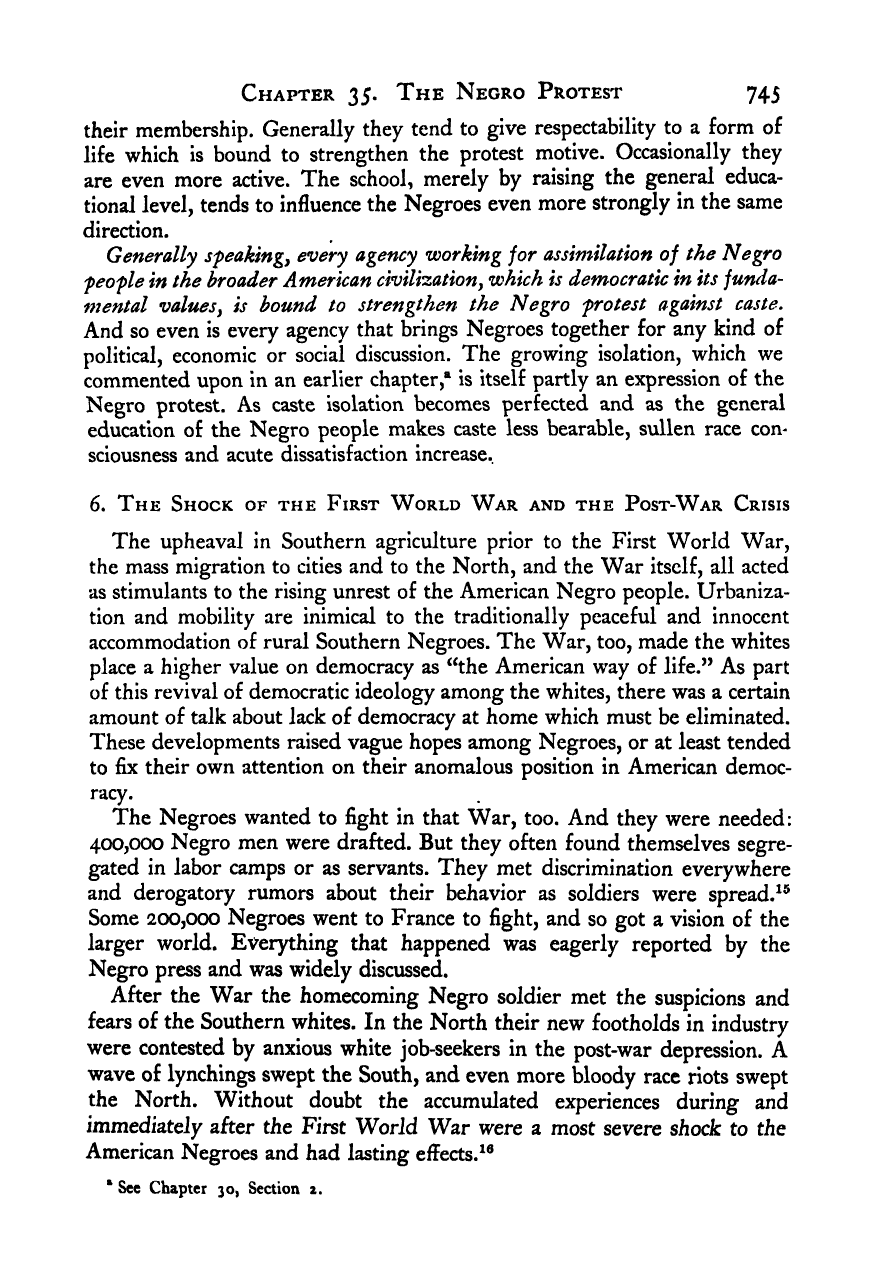Note: Gunnar Myrdal died in 1987, less than 70 years ago. Therefore, this work is protected by copyright, restricting your legal rights to reproduce it. However, you are welcome to view it on screen, as you do now. Read more about copyright.
Full resolution (TIFF) - On this page / på denna sida - IX. Leadership and Concerted Action - 35. The Negro Protest - 5. The Protest Is Still Rising - 6. The Shock of the First World War and the Post-War Crisis

<< prev. page << föreg. sida << >> nästa sida >> next page >>
Below is the raw OCR text
from the above scanned image.
Do you see an error? Proofread the page now!
Här nedan syns maskintolkade texten från faksimilbilden ovan.
Ser du något fel? Korrekturläs sidan nu!
This page has never been proofread. / Denna sida har aldrig korrekturlästs.
Chapter 35. The Negro Protest 745
their membership. Generally they tend to give respectability to a form of
life which is bound to strengthen the protest motive. Occasionally they
are even more active. The school, merely by raising the general educa-
tional level, tends to influence the Negroes even more strongly in the same
direction.
Generally sfeaking^ every agency working for assimilation of the Negro
feofle in the broader American civilisationy
which is democratic in its funda-
mental valueSy is bound to strengthen the Negro frotest against caste.
And so even is every agency that brings Negroes together for any kind of
political, economic or social discussion. The growing isolation, which we
commented upon in an earlier chapter is itself partly an expression of the
Negro protest. As caste isolation becomes perfected and as the general
education of the Negro people makes caste less bearable, sullen race con-
sciousness and acute dissatisfaction increase.
6. The Shock of the First World War and the Post-War Crisis
The upheaval in Southern agriculture prior to the First World War,
the mass migration to cities and to the North, and the War itself, all acted
as stimulants to the rising unrest of the American Negro people. Urbaniza-
tion and mobility are inimical to the traditionally peaceful and innocent
accommodation of rural Southern Negroes. The War, too, made the whites
place a higher value on democracy as ^^the American way of life.” As part
of this revival of democratic ideology among the whites, there was a certain
amount of talk about lack of democracy at home which must be eliminated.
These developments raised vague hopes among Negroes, or at least tended
to fix their own attention on their anomalous position in American democ-
racy.
The Negroes wanted to fight in that War, too. And they were needed:
400,000 Negro men were drafted. But they often found themselves segre-
gated in labor camps or as servants. They met discrimination everywhere
and derogatory rumors about their behavior as soldiers were spread.^^
Some 200,000 Negroes went to France to fight, and so got a vision of the
larger world. Everything that happened was eagerly reported by the
Negro press and was widely discussed.
After the War the homecoming Negro soldier met the suspicions and
fears of the Southern whites. In the North their new footholds in industry
were contested by anxious white job-seekers in the post-war depression. A
wave of lynchings swept the South, and even more bloody race riots swept
the North. Without doubt the accumulated experiences during and
immediately after the First World War were a most severe shock to the
American Negroes and had lasting effects.^®
* Sec Chapter 30, Section 1.
<< prev. page << föreg. sida << >> nästa sida >> next page >>